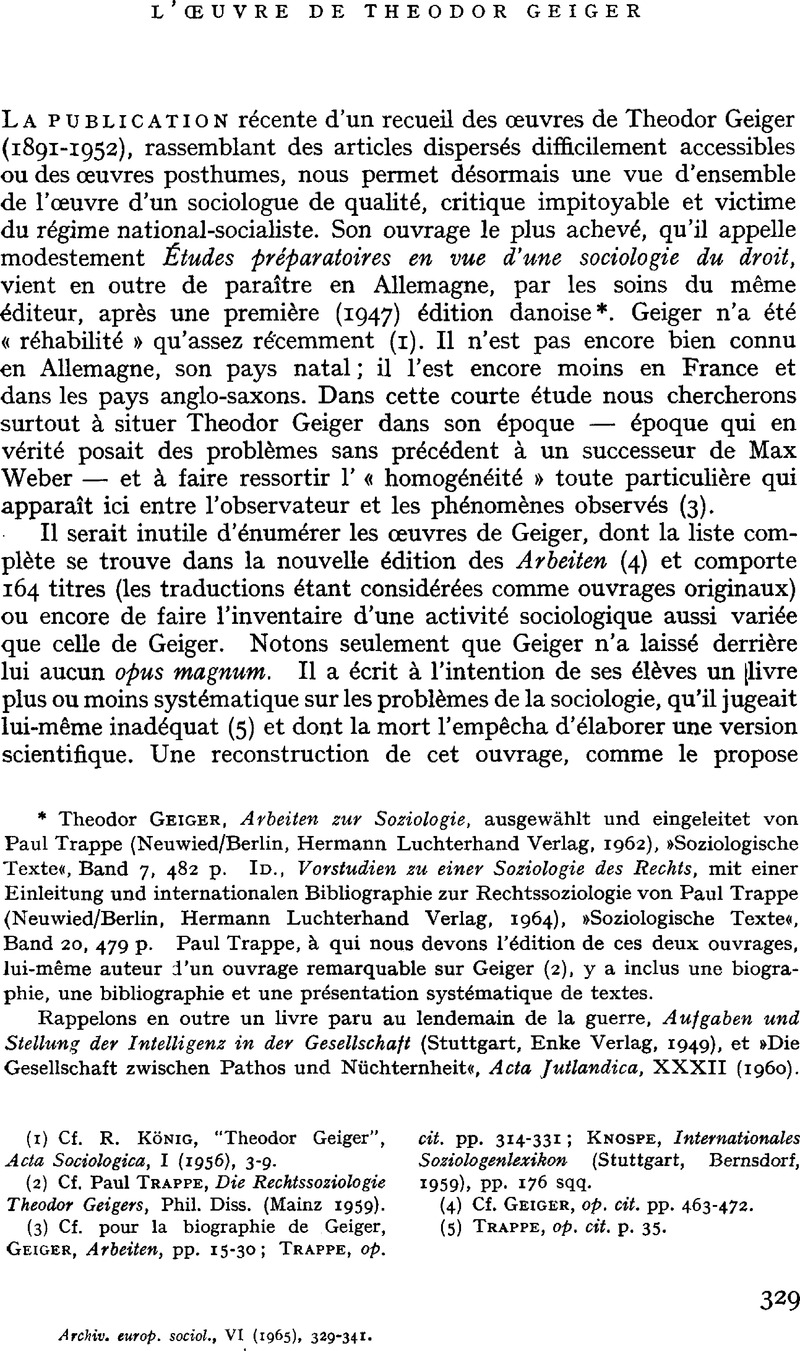No CrossRef data available.
Published online by Cambridge University Press: 28 July 2009

* Geiger, Theodor, Arbeiten zur Soziologie, ausgewählt und eingeleitet von Paul Trappe (Neuwied/Berlin, Hermann Luchterhand Verlag, 1962)Google Scholar, »Soziologische Texte«, Band 7, 482 p. Id., Vorstudien zu einer Soziologie des Rechts, mit einer Einleitung und internationalen Bibliographie zur Rechtssoziologie von Paul Trappe (Neuwied/Berlin, Hermann Luchterhand Verlag, 1964), »Soziologische Texte«, Band 20, 479 p. Paul Trappe, à qui nous devons l'édition de ces deux ouvrages, lui-même auteur d'un ouvrage remarquable sur Geiger (2), y a inclus une biographie, une bibliographie et une présentation systématique de textes.
Rappelons en outre un livre paru au lendemain de la guerre, Aufgaben und Stellung der Intelligenz in der Gesellschaft (Stuttgart, Enke Verlag, 1949)Google Scholar, et »Die Gesellschaft zwischen Pathos und Nüchternheit«, Acta Jutlandica, XXXII (1960)Google Scholar.
(1) Cf. König, R., “Theodor Geiger”, Acta Sociologica, I (1956), 3–9.CrossRefGoogle Scholar
(2) Cf. Trappe, Paul, Die Rechtssoziologie Theodor Geigers, Phil. Diss. (Mainz 1959).Google Scholar
(3) Cf. pour la biographie de Geiger, Geiger, , Arbeiten, pp. 15–30Google Scholar; Trappe, , op. cit. pp. 314–331Google Scholar; Knospe, , Internationales Soziologenlexihon (Stuttgart, Bernsdorf, 1959). pp. 176 sqq.Google Scholar
(4) Cf. Geiger, , op. cit. pp. 463–472.Google Scholar
(5) Trappe, , op. cit. p. 35.Google Scholar
(6) Ibid. p. 36.
(7) Geiger, , op. cit. p. 79.Google Scholar
(8) Ibid. p. 88.
(9) Ibid. p. 89.
(10) Ibid. pp. 206–259, 186–205.
(11) Ibid. pp. 114–150.
(12) Ibid. pp. 260–292, « Formen der Vereinsamung ».
(13) Ibid. pp. 293–334.
(14) Cf. maintenant aussi Geiger, , op. cit. pp. 335–353.Google Scholar
(15) Aufgaben und Stellung der Intetligenz in der Gesellschaft (Stuttgart, Enke, 1949).Google Scholar
(16) Cf. son importante critique de Mannheim: Geiger, , op. cit. pp. 412–430.Google Scholar
(17) Die Gesellschaft zwischen Pathos und Nüchternheit, Acta Jutlandica, XXXII (1960).Google Scholar
(18) Cf. aussi Geiger, , op. cit. pp. 171–185.Google Scholar
(19) Pathos, p. 87.Google Scholar
(20) Ibid.
(21) Vorstudien zu einer Soziologie des Rechts, , Acta Jutlandica, XIX (1947)Google Scholar. Cf. aussi notre paragraphe IV.
(22) Sont accessibles pour ceux qui ignorent le suédois un résumé de sa philosophie dans Philosophie der Gegenwart in Selbstdarstellungen (Leipzig 1929), tome VII, pp. 111–159Google Scholar, et ses Inquiries into the Nature of Law and Morals edited by Olivecrona, (Uppsala 1953).Google Scholar
(23) Cf. Ranulf, Svend, Moral Indignation and Middle Class Psychology (Uppsala 1938)Google Scholar et “Methods of Sociology”, Acta Jutlandica, XXVII (1955)Google Scholar. Pour une vue d'ensemble, cf. Segerstedt, T. T., The Uppsala School of Sociology, Acta Sociologica, I (1956), 83–119.Google Scholar
(24) Trappe, , op. cit. p. 101Google Scholar: « Rechtssoziologie bedeutet für ihn Recbt im Beson-deren und soziale Ordnung im Allgemeinen als Faktizitäten, als Wirklichkeitszusam-menhänge zu untersuchen, das heißt aber, jede Einmengung metaphysischer Vorstellungen fern zu halten. »
(25) Trappe, , op. cit. p. 135.Google Scholar
(26) Ibid. p. 202: « Macht ist die Chance, gewisse Ereignisabläufe steuern zu können.»
(27) Ibid. p. 224: « Wertnihilismus bedeutet, daß ‘Gut und Schlecht völlig imaginäre Begriffe sind, jeder empirischen Fassung ihres vermeintlichen Inhalts unzugänglich und deshalb, für ein rationales Weltbild wenigstens, nicht existent’ ».
(28) Geiger, , op. cit. p. 403.Google Scholar
(29) Op. cit. p. 229.
(30) Il s'agit notamment du livre Etkische Fragen (Wien 1930)Google Scholar que nous proposons d'ajouter à l'excellente bibliographie de M. Trappe.
(31) Geiger, , op. cit. p. 404.Google Scholar
(32) Ibid.
(33) Selon le résumé de Trappe, , op. cit. pp. 143 sq.Google Scholar
(34) Cf. Trappe, , op. cit. pp. 155 sq.Google Scholar